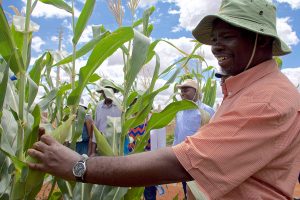NAIROBI, Kenya – Increasing public understanding of genetically modified crops and creating supportive policies were key recommendations made at a session on boosting Africa’s use of biotechnology at the 7th Africa Agricultural Science Week.

With the population of sub-Saharan Africa projected to reach between 1.5 and 2 billion by 2050 and agriculture struggling to adapt to climate change, the pressure to meet the increasing demand for staple foods, including maize and wheat, has raised interest in biotechnology’s ability to boost yields.
Despite a recent U.S. National Academy of Science study concluding that genetically engineered crops are safe to grow and eat, and growing support for the use of genetically modified (GM) crops, there continues to be controversy around biotechnology.
The African Agricultural Technology Foundation (AATF) hosted a session on “Taking GM crops to market in sub-Saharan Africa: Special focus on policy and regulatory environment,” to discuss policy challenges to biotechnology in Africa.
Participants recommended raising public understanding of biotechnology through farmer and consumer education while enhancing functional policy and regulatory systems to facilitate testing and uptake of demand-driven GM products. The recommendations were to be presented to policymakers in the region.
At the session, Stephen Mugo, CIMMYT principal breeder and regional representative for Africa, spoke on biotechnology’s ability to improve conventional breeding.
“Genetic modification can be used in specific cases, for example, when a trait is very difficult to improve by conventional breeding methods or when it will take a very long time to introduce and/or improve such trait in the crop using conventional breeding methods,” said Mugo. “The use of biotechnology can maximize yield gains in ways that are compatible with human and environmental safety.” Hence, farmers should be given a chance to benefit from GM crops because they could increase their opportunities, productivity and efficiency.
Although GM crops have been grown across the globe for the last 20 years, only three African countries — Burkina Faso, South Africa and Sudan — currently grow them. This is largely due to the controversy and ambivalence surrounding biotechnology policies, with most countries taking a precautionary approach towards adopting biotechnology.
As Francis Nang’ayo, AATF head of Regulatory Affairs said, “Most African countries have taken a precautionary policy position on GM technology borrowed largely from the Cartagena Protocol on Biosafety, which many countries signed, and which was primarily adopted to ensure environmental conservation.”
This, alongside other factors, such as their commitment to abide by other international conventions and the debate on GM technology, are keeping most African countries from adopting policies that support biotechnology. Nang’ayo added that most countries have adopted stringent regulatory frameworks governing different GM processes and that this apparent overregulation has inhibited advancement of GM technology into the hands of farmers.
However, there has been notable progress in countries such as Kenya, which recently approved the environmental release of genetically transformed maize that carries genes from Bacillus thuringiensis (Bt) following an application submitted to the National Biosafety Authority by AATF and the Kenya Agricultural Livestock and Research Organization under the Water Efficient Maize for Africa project. This is expected to serve as a litmus test for many African countries that are already conducting confined field trials of GM crops.
Still, most African smallholder farmers have no knowledge of or access to biotechnology. According to Gilbert Bor, a farmer from Kapseret in northwest Kenya, “Many farmers know and understand that seeds in our fields are from science and research, so new and innovative technologies including biotechnology need to trickle down to farmers once proven safe. If such a technology promises farmers improved productivity, income and livelihood, and the likelihood of reducing use of pesticide and insecticide, then it’s important that farmers and consumers are educated and informed.”
 Climate adaptation and mitigation
Climate adaptation and mitigation 
